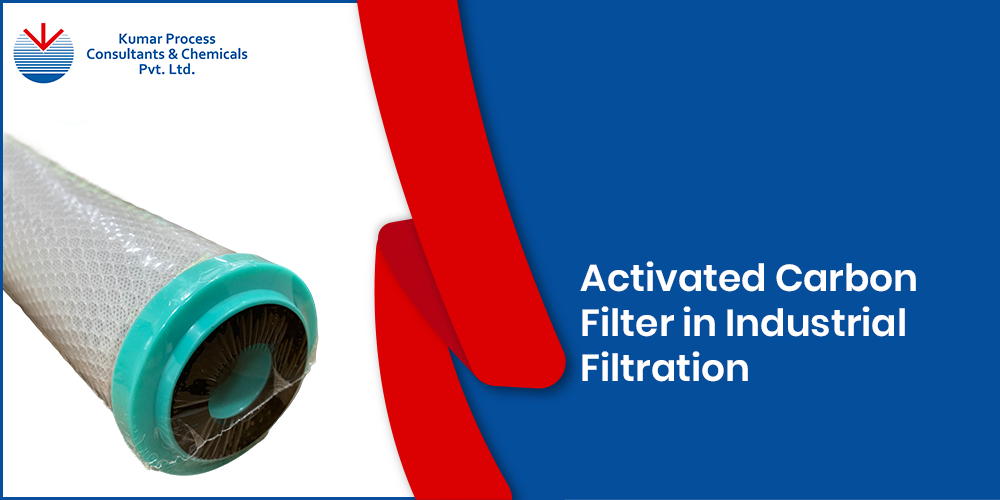Activated Carbon Filter in Industrial Filtration

Activated carbon filters are an effective solution for removing dissolved impurities in a variety of industrial applications. These filters use activated to capture contaminants and deliver cleaner, safer liquid or gas. In this blog, we’ll explore how activated carbon filters are used in industries, their benefits, and key factors to implement them in your processes.
Use of Activated Carbon Filters in Industries
Activated carbon filters have activated carbon made from carbon rich sources like coconut shells, coal, and wood, which undergo a high temperature activation process. This process creates a highly porous structure that increases surface area to make it available for adsorption of molecules. The increased surface area gives rise to tremendous surface energy, the reduction of which is the driving force for adsorbtion of small molecules. As a contaminated liquid or gas passes through the filter, the dissolved impurities adsorb onto the carbon surface, thus lowering the surface energy of the system. This process traps the impurities and thus, the filtrate has reduced dissolved impurities.
Key Benefits of Activated Carbon Filtration
- Efficient Contaminant Removal
Activated carbon filtration effectively eliminates organic compounds, chlorine, pesticides, volatile organic compounds (VOCs), and polyfluoroalkyl substances (PFAS), and industrial pollutants.
- Improved liquid & Gas Quality
By removing harmful substances, activated carbon in filters enhances the taste and odour of the product.
- Cost Effective
Activated carbon filters are one of the most cost-effective solutions for removal of dissolved impurities in liquids or gases. The carbon can be regenerated, making it fit for the next cycle of adsorbtion.
Industrial Applications of Activated Carbon Filters
- Water Treatment:
Industries use activated carbon in filters to remove chlorine, chemicals, and organic impurities from water, wastewater, and process water. This ensures the delivery of high-quality water while maintaining product security.
- Gas Filtration:
Activated carbon filtration is used in industrial gas filtration systems to capture VOCs, odors, and harmful gases released from manufacturing plants, chemical facilities, and waste treatment plants.
- Biogas Purification:
Renewable energy facilities use activated carbon filters to remove hydrogen sulfide, siloxanes, and other contaminants from biogas, improving energy efficiency and reducing emissions.
How to choose the right Activated Carbon Filtration System?
When selecting an activated carbon filter, industries must consider below factors like:
- Particle Size: Smaller carbon particles provide better adsorption which may increase pressure drop in filtration systems.
- Type of Carbon: Granular, powdered, or extruded carbon is chosen as per specific needs of an industrial application. The adsorbtion properties of molecules are also a function of the source of the carbon, meaning that activated carbon from coconuts will perform differently compared to activated carbon from bamboo.
- Pre-Treatment Needs: Some applications require pre-filters to extend the lifespan of activated carbon in filters. Removal of solids which can pack the carbon bed ensures that the carbon filtration system has a long life, determined only by saturation of the surface area of the activated carbon.
- Maintenance: Regular monitoring and timely replacement ensures optimal filtration efficiency.
Get High Quality Activated Carbon Filters
Kumar Process Consultants offers activated carbon filtration systems for chemical, pharmaceutical, and other industries to remove contaminants from industrial processes. Our advanced activated carbon filters effectively eliminate organic compounds, harmful chemicals like chlorine, and unpleasant odors.
Looking for the best activated carbon filter for your industrial needs? Contact Kumar Process Consultants for expert guidance and tailored filtration solutions.
FAQS
What is the function of activated carbon?
Activated carbon is used to remove impurities, contaminants, and unwanted substances from liquids and gases through adsorption. It effectively eliminates organic compounds, odors, chlorine, and other harmful chemicals.
What are the two types of activated carbon?
The two primary types of activated carbon are powdered activated carbon (PAC) and granular activated carbon (GAC). PAC has fine particles for quick adsorption, while GAC consists of larger granules for long-term filtration.
How to make activated carbon?
Activated carbon is made by carbonizing materials like coconut shells, wood, or coal in the absence of oxygen, then activating them with high temperatures and steam to create a highly porous structure for adsorption.


